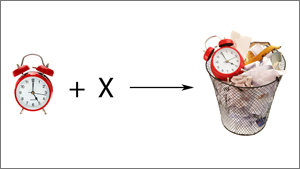Five Ways Scientists Waste Time
by
 Notice the title is not “The only 5 ways scientists waste time…” Labs can be filled with a million distractions, and these days most of them reside on the internet. But we’re not talking about killing two hours on Hot or Not. We’re talking about how we waste time when we don’t know we’re wasting time. Those are the killers. And these days, with funding tight and postdocs seeming to stretch into oblivion, wasting time can have serious consequences.
Notice the title is not “The only 5 ways scientists waste time…” Labs can be filled with a million distractions, and these days most of them reside on the internet. But we’re not talking about killing two hours on Hot or Not. We’re talking about how we waste time when we don’t know we’re wasting time. Those are the killers. And these days, with funding tight and postdocs seeming to stretch into oblivion, wasting time can have serious consequences.
1. Not having a plan
How do we even know if we’re wasting time if we don’t know what we’re supposed to be doing? In research, setting a goal or establishing a plan can be frustrating given that science is completely unpredictable. Think about what you were working on two years ago – did you predict the project would unfold exactly as it did? Setting long term goals is great for the big picture, but “solve the crystal structure of all membrane proteins” may not be the best three to six month plan…
Setting a three month goal will give you a milestone to aim for. More importantly, in three months, you will be forced to sit down and see if you made it or not. It took me a long time to learn this lesson. It’s incredible how quickly time can pass and before you know it, we’ve been troubleshooting an assay or reaction for a year. Forced points of objective analysis will help us realize when we’ve strayed too far from the path.
Google calendar has made the reminder pretty painless. The actual analysis- well, that may not be as easy…
2. Overthinking it
Take any experiment and we can come up with at least twice as many reasons it could fail than it could succeed. Part of that is because it’s probably true. Part of it is justifying procrastination. Maybe it’s a new technique that we really don’t feel like learning, or maybe it’s a fear of failure. After all, as long as we have a great hypothesis, great results may be in our future. Once it fails, we’re back to square one. Or so we think…
A trick I was taught is to think about a project as a series of failures required to get to the truth. In other words, “If I’m going to find this receptor, I’m going to perform 89 failed experiments before I get there.” I don’t recommend actually counting- or intentionally failing experiments… However, the reason this helps is that it takes the fear of failure out of the equation. If we understand that failure is an essential part of achieving success, then it doesn’t seem so bad anymore. The key is to make sure we’re not just doing sloppy work. The idea is to do careful experiments, learn something from each one and move on. So quit overthinking it and just do it.
3. Working on too few/too many projects
I don’t like vague suggestions any more than the next scientist. But unfortunately, this point is different for everyone. The merits of multi-tasking versus completing tasks in a linear fashion could be an entire debate in and of itself. However, in research there may be a happy medium between the two. Whether it’s a reaction stirring, a gel running or cells dividing, science is full of incubations. Sitting idly by while time ticks away is a mistake. So is trying to squeeze six experiments into a day and messing up five of them as a result. Finding our own level of comfort in juggling experiments is critical to graduating in under 10 years…
4. Trying to come up with the Nature cover experiment
There’s nothing wrong with trying to design the project or experiment that will have the maximum impact. However, there is something wrong with refusing to do anything that may be considered less than that. This can be a paralyzing game that many of us get caught up in. We chase a figure or an assay that we just know would change the way people think about science. We’re not saying to quit, but as chemist99 put it in the comments of The Evolution of Scientific Impact, “hit a few singles and doubles while lining up a home run.”
5. Reinventing the wheel
“Research” doesn’t mean re-search… It’s probably better we don’t know as a profession how much time has been spent re-developing assays, techniques and reagents. Undoubtedly, that would be a large number. Whether it’s out of stubbornness or ignorance, it’s no excuse. A hard-headed former colleague of mine spent over a year developing a “novel” assay for an incredibly routine process. The absurdity of it made it hard to watch. And, of course, the reviewers of the manuscript demanded they repeat their experiments using the industry standard assay anyway. Shocker… One year, down the drain.
Research is too difficult and takes too long to waste significant chunks of time unnecessarily. So avoiding some of the time sinks above may help free up some time… time that could be better spent on Facebook finding out what ever happened to your friend who moved away in third grade…
.


5 Laboratory Techniques That’ll Get You Punched in the Face | BenchFly Blog - For Your Life in Science
wrote on June 16, 2010 at 10:41 am
[…] hope and love. Specifically, it requires those dirty gel plates you just put in the sink. Stop wasting time and pick up a […]